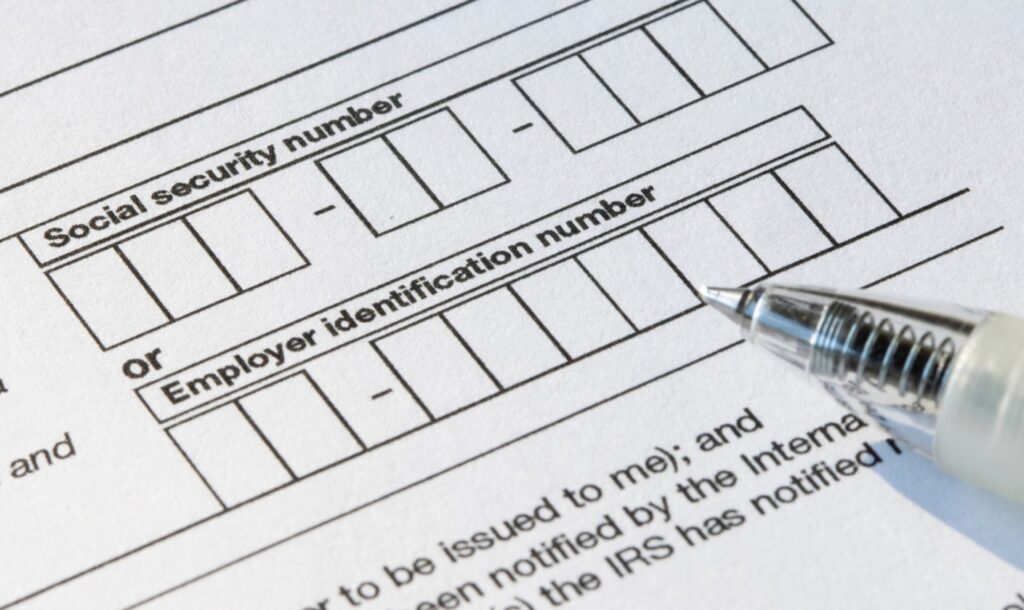The United States Internal Revenue Service provides Employer Identification Numbers, or EINs, to businesses. But what is an EIN? An Employer Identification Number (EIN) is a unique nine-digit number like the Social Security numbers that are provided to Americans at birth, which, in some cases, can also be used instead of an EIN. The IRS uses this federal tax identification number to track income and taxes for business entities.
For those who are not Americans or who are new to running a business, Employer Identification Numbers might seem confusing. Fortunately, it’s more straightforward than it seems.
What Is an Employer Identification Number (EIN) Used For?
The various uses of EINs show how they are both useful and sometimes necessary for anyone who does business or owns a business entity in the U.S. However, some of those uses happen only rarely.
- Opening Business Bank Accounts – most banks ask for an EIN when you open your business bank account. Your EIN is also used for your business credit card. If you are a sole proprietor, you can use your Social Security Number (SSN) for your business bank account instead of an EIN.
- Hiring Employees – before you hire employees, you must obtain an EIN. The IRS uses this number for tracking your payroll tax remittances.
- Filing Business Tax Returns – Businesses need EINs if they are required to file excise tax returns and other types of returns like firearms, tobacco, alcohol, etc.
- Signing Contracts – Freelancers may use EINs to sign contracts to protect their Social Security Numbers. Some companies may require EINs instead of SSNs.
- Communicating with the IRS – your EIN is used when communicating about tax returns, including making payments, receiving refunds, or filing disputes.
What Types Of Businesses Need An EIN?
The vast majority of business entities, including tax-exempt ones, require EINs.
Nonprofit Organizations
Even though nonprofits are exempt from paying taxes, they are still required to have an EIN to hire employees, open a business account, and report their income.
Partnerships and Corporations
Any company, including small businesses and any member LLC that operates in the United States and meets these requirements, needs an employer identification number.
- If you employ others
- If your business is a corporation or partnership
- If you file tax returns for employment, excise, alcohol, tobacco, or firearms.
- If you withhold taxes on income — in addition to wages — for non-resident aliens.
Self-Employed Individuals
If you are self-employed and participate in a Keogh retirement plan, you will need an EIN. If you’re an American, you might also feel more secure providing an EIN to business associates instead of your Social Security number to thwart identity theft, even if you’re a sole proprietorship that doesn’t legally require an EIN.
Other Organizations and Businesses
Those involved in trusts, estates, real estate mortgage investment conduits, and farmer’s cooperatives also require an EIN. Even if you do not see your type of business on this list, you may need an EIN.
Do EINs Differ From State To State?
Because the IRS issues your Employer Identification Number, a department of the federal government, it remains the same no matter which state you operate in. However, some states issue businesses an additional employer identification number for state taxes, so you must know if a state uses its own EIN system if your business moves or expands.
Applying For A New EIN
Fortunately, registering for an employer identification number is relatively simple and always free, even if you have an existing business. However, you will need a new EIN when changing your business structure to add partners, incorporate, merge, or become a subsidiary.
If your business entity is in a U.S. state or territory and already has a Taxpayer Identification number such as a Social Security, Employer Identification, or Individual Taxpayer Identification Number, you can complete your EIN application online and receive your EIN immediately after submitting IRS Form SS-4. Note that the Internal Revenue Service only allows one person who controls the business to apply per day. Mail and fax options are also available to Americans.
International applicants must complete the process over the phone. Applicants must answer questions similar to those on Form SS-4 on the IRS website. You can also name a third-party designee to receive your employer identification number and answers to questions on contracts while waiting for your EIN. This is useful if you have an existing business and need to provide your EIN to a company you plan to work with.

How many EINs can you have?
The number of EINs you can have associated with your business depends entirely on how your business runs and how you classify your business. For instance, a sole proprietorship will only be entitled to one Employer Identification Number. They will also only need one EIN to accurately file tax returns.
There are some scenarios in which your EIN may need to be updated and therefore may be subject to change. If the owner of the business changes or the business becomes acquired by another, you will have to send the correct paperwork to the IRS letting them know of such changes, allowing them to update and re-issue your EIN accordingly.
However, organizations such as corporations or LLCs usually operate in a multi-member business capacity. For this reason, the number of EINs these types or organizations are allowed is unlimited.
How long does it take to get an EIN?
When you apply for your Employer Identification Number there are several routes you can take, which affects how long it takes to get an EIN. The IRS issues EINs for free and offers applicants three main methods of applying for their EIN.
The quickest and arguably easiest way to get your EIN is online, via the IRS website. The online portal allows EIN applicants to fill in an online form which does not usually take longer than 30 minutes to complete. Upon completion, applicants will be issued with their EIN immediately, provided that all the information they have given is correct.
Other methods of applying include via post (mail) or fax. To apply for an EIN through the mail, you need to fill out an SS-4 form and mail it to the Internal Revenue Service, Attn: EIN Operation, Cincinnati, OH 45999. The turnaround time for postal applications is usually 4 weeks or longer.
You can also submit an EIN application via fax. To do so, fill out an SS-4 form and fax it to (855) 641-6935 to complete your application.
What type of EIN should you apply for?
The IRS has several ways of identifying individuals and businesses for tax reporting purposes. Individuals are usually identified through their social security number, and multi-member businesses through Tax Identification Numbers (TINs) or through their Employer Identification Numbers (EINs). It’s worth noting that an EIN is a type of TIN.
If you own a business but do not employ anyone, you will be able to file tax returns using your social security number. However, having an EIN is easier when you need to keep your personal and business expenses separate from one another.
If you are applying for a TIN on behalf of a multi-member business or if you are an employer of others, you will need to apply for an EIN or a Federal Employer Identification Number (FEIN).
What happens after you have obtained an EIN?
Once you’ve obtained your EIN, congratulations, it’s official. You now have a legally registered business! Having an EIN will allow you to pull together all the other components you need to get your business off the ground.
Having your EIN will allow you to open a business bank account, apply for business credit cards, and implement pension plans for yourself and your employees. From a legal perspective, having an EIN will also enable you to apply for the necessary business licenses and ensure you have all the necessary agreements in place if you are acting as a specialized service provider or as a vendor.
An EIN will also help the IRS keep track of tax reports associated with your business, ensuring you remain tax compliant throughout the operation.
Other Terms For Federal Tax ID Numbers
EINs are just one type of Taxpayer Identification Number (TIN). Some people refer to this category as a Federal Employer Identification Numbers (FEINs), including the following subtypes.
- Social Security numbers (SSNs) – used by individuals for tax and other identification purposes.
- Individual Taxpayer Identification Number (ITIN) – a type of TIN required to process taxes if you are a nonresident alien (or a dependent of one) who cannot get a Social Security Number. Certain resident aliens and their dependents may need an ITIN.
- Adoption Taxpayer Identification Number (ATIN) – temporarily provided to people in the process of adopting a child that is a citizen or resident of the United States.
- Preparer Tax Identification Number – used by paid tax preparers to identify themselves on tax returns.
Using An EIN Lookup Service
If you need to find your own EIN, you can contact the IRS. However, to find nonprofit’s EIN or an EIN for a private business, you may need to use an EIN lookup service such as EINSearch.com to find the company’s EIN.

